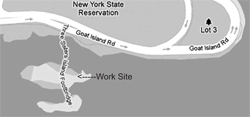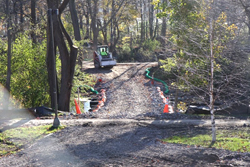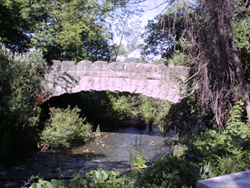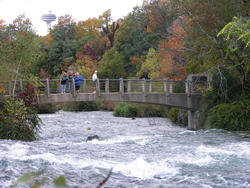Corps of Engineers Is Probing State Parks
By James Hufnagel
The US Army Corps of Engineers, Buffalo District has opened an official investigation into possible violations of federal law by the New York State Office of Parks, Recreation and Historic Preservation resulting from the implementation of its "Landscape Improvements" plan in Niagara Falls State Park.
An enforcement officer at the Army Corps last week confirmed that by blocking the section of the Niagara River between Goat Island and the innermost of the Three Sisters Islands, filling in the waterway with earthen fill to construct an access road for heavy construction vehicles without having applied for or obtained the necessary federal permits, State Parks may have violated statutes regulating the stewardship of US waters.
Shortly after this story broke in the February 19 issue of the Reporter, State Parks ramped up activity at the site in what appeared to be an attempt to complete construction before the Army Corps issues a stop work order to halt further damage to the formerly pristine area.
The crude, temporary road was constructed to afford State Parks bulldozers access to Three Sisters Islands, where they have obliterated the natural landscape by clearing trees, as well as boulders that have been scoured into exquisite shapes by ancient river currents, to make way for sidewalks, stairways and viewing platforms.
Requests for comment from New York State Parks Commissioner Rose Harvey and Western District Director Mark Thomas have gone unanswered.
In an email dated March 24, 2013, Army Corps enforcement officer Joseph E. Kassler informed the Reporter that "... a permit from the Corps of Engineers would be necessary for the work being done, and an application for such a permit should have been made; our records do not show that an application was submitted for this project. There is a simple permit available for construction access work, and we would like to inspect the project... I will provide you with the details of our investigation."
Kassler also stated that thus far, State Parks has been less than cooperative: "I've attempted to speak with contacts at the NYSOPRHP (State Parks) regarding the work being done in the Niagara River off Three Sisters Island; I've had no returns on my calls as yet..."
The penalty for violating the Clean Water Act, as is apparently being perpetrated by State Parks in its bulldozing over a section of the Niagara River, ranges from a maximum fine of $37,500 per day the violation is taking place, up to prison time if the act is considered particularly malicious, deliberate or repeated.
A "Memorandum of Agreement" between the Army Corps and the Environmental Protection Agency, which may be called upon for additional enforcement actions in cases as egregious as this, states that "No after-the-fact permit application shall be accepted until resolution has been reached through an appropriate enforcement response... e.g., until all administrative, legal and/or corrective action has been completed, or a decision has been made that no enforcement action has been taken."
What that should mean is that State Parks can't just say, "Oops, sorry for the oversight."
The Niagara Falls Reporter will be watching to see what kind of enforcement action the Army Corps takes against State Parks, especially considering that the local Buffalo office did not respond to our official complaint for an entire month, and then only after the complaint was resubmitted with a copy forwarded to their Washington, DC superiors.
A branch of the Niagara River, the connection between two Great Lakes and ultimately the source of water for millions of people, which also serves as the centerpiece of a world-famous natural and historic attraction, was deliberately and furtively dammed off to facilitate construction activities which will exclusively benefit State Parks and their corporate overseers, without benefit of permits required by law.
The public record is replete with instances where the "Feds" came down like a ton of bricks on private individuals who may have inadvertently spilled fill into a creek or impacted a wetland, in order to build a house or improve the bottom line of a small farm.
Will they treat a powerful state agency like New York State Parks on an equal footing with average citizens?
We'll find out.



